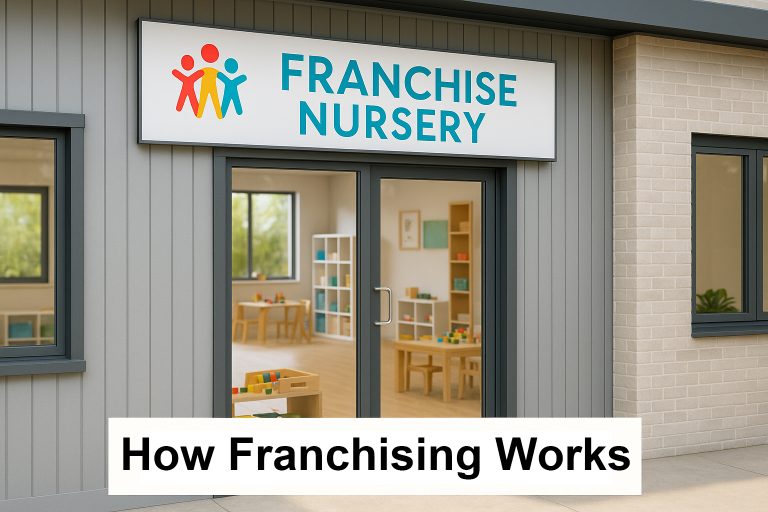Opening a Nursery via Franchise
An In-Depth Guide
Opening a nursery is an exciting and rewarding venture – you’ll be shaping young children’s lives and providing a valuable service to families.
As you embark on this journey, one big question is likely on your mind: should I open my nursery as part of a franchise, or start independently on my own? Both paths can lead to a thriving childcare business, but they come with very different costs, obligations, and freedoms.
In this comprehensive guide, we’ll walk through how franchising works in the nursery industry, weigh the pros and cons of franchised vs. independent nurseries.
By the end, you should have a clear idea of which path aligns with your goals – and you’ll know that whichever route you choose, there is help available to ensure you succeed.

Contents:
How Nursery Franchising Works (Costs, Support, and Restrictions)
What is a nursery franchise?
In simple terms, franchising means you’re buying the rights to use an established company’s brand and business model. Instead of creating a nursery brand from scratch, you could purchase a franchise license from an existing nursery chain. Some well-known childcare franchises in the UK are Monkey Puzzle Day Nurseries, Kiddi Caru, Banana Moon, Fennies, and Busy Bees. These companies have successful nurseries and they allow individuals to open new locations under their brand name in exchange for fees.
When you become a franchisee, you typically pay an initial franchise fee up front. In the nursery sector, this fee alone can range roughly from £20,000 to £50,000 depending on the franchise. What do you get for that fee? Usually, the franchisor (the parent company) will provide a package of support to get you started. This often includes things like initial training for you (and sometimes your senior staff), an operations manual (detailing how to run the nursery day-to-day), branding materials and use of their trademarks, assistance with setting up (maybe help with finding a site or designing the interior), and marketing support for your grand opening. Essentially, you are paying for their know-how and reputation.
Beyond that initial fee, there is the total investment required to open the nursery. This includes securing a suitable property or building (lease costs or purchase, plus any refurbishment to meet the franchise’s standards), equipping the classrooms and play areas, obtaining licenses and insurance, recruiting staff, and advertising to enroll children. One industry source estimates the initial investment for a day nursery franchise can range between £50,000 to £150,000 (inclusive of the franchise fee and setup costs) in typical cases. Some larger franchises or prime locations may demand even more; for example, starting a franchise with a well-established brand can require a total investment between £150,000 and £400,000 in some cases. This wide range depends on the specific franchisor’s requirements, the size of the nursery you plan to open, and local property costs.
Once your franchised nursery is up and running, you will also owe ongoing fees to the franchisor. The most common is a royalty fee – usually a percentage of your revenue (sales). In childcare franchises, it’s common to see royalties around 5% to 10% of monthly income. This means every month, a slice of your nursery’s earnings is paid back to the franchisor. In addition, many franchises charge a marketing or advertising fee (perhaps an additional 1-2% of revenue) which goes into a collective marketing fund to promote the brand nationally or regionally. These ongoing fees are essentially the price for continued support and use of the brand. The franchisor may use them to provide ongoing training updates, centralized marketing campaigns, new curriculum materials, and business support for franchisees.

Territory and restrictions:
When you buy a franchise, you will likely be granted a territory – an area where you are the exclusive franchisee of that brand. This protects you from internal competition (the franchisor won’t allow two of their nurseries right next to each other), but it also means you usually can’t open additional sites outside your area without permission. The franchise agreement will contain a lot of rules you agree to follow. Franchisors have guidelines to ensure consistency across all their locations. This covers everything from the look of the classrooms, the curriculum or educational philosophy used, the suppliers you must buy certain products from, to the pricing and promotions you can offer. Essentially, although you own your individual nursery business, you must run it according to the franchisor’s system. They will conduct periodic checks or audits, and you’ll be in regular contact with their support team to make sure the nursery meets the brand’s standards.
Duration of the franchise:
Franchise agreements are typically time-limited (often 5, 10 or 15 years). After that term, you have the option to renew – usually for another fee (called a renewal fee). If you ever want to sell your nursery, the franchisor usually has to approve the buyer, and they may charge a transfer fee as well. And if you want to exit the franchise early, there could be penalties. These are all things to carefully consider when entering a franchise contract.
In summary, franchising a nursery means paying for a proven model. You invest a significant sum for the privilege of using a reputable name and receiving guidance. You get a ready-made blueprint and support network, but you also operate under strict rules and ongoing financial obligations to the franchisor.
Pros of Franchising a Nursery
 Franchising wouldn’t be popular if it didn’t offer real advantages. Here are some of the key benefits of opening a nursery as a franchise:
Franchising wouldn’t be popular if it didn’t offer real advantages. Here are some of the key benefits of opening a nursery as a franchise:
- Established Brand & Reputation: Perhaps the biggest draw. By joining a known franchise, you instantly gain a name that parents may recognize and trust. This can give you a marketing head-start. Families might be more willing to inquire or enroll because they are already familiar with or have heard good things about the brand. Essentially, you’re leveraging the goodwill and credibility the franchisor has built over the years.
- Proven Business Model: A good franchise has already figured out what works (and what doesn’t) in running a nursery. They have refined their curriculum, daily schedules, operational procedures, and business practices through experience. This means as a franchisee, you’re less likely to make rookie mistakes. You’re following a tested playbook. This can increase your chances of success since you’re not starting from zero or experimenting on critical aspects – you know the formula has worked elsewhere.
- Training and Ongoing Support: Franchisors provide training for franchise owners and sometimes their staff. This might include training on early years education techniques, managing the business side of a nursery, compliance with regulations, and customer service. Many franchisors also send support staff to help you during your launch period. You have access to expertise whenever you need it – be it troubleshooting enrollment numbers or improving parent communication. It’s like having a built-in consultant. Ongoing support could include regular check-ins, newsletters with best practices, updated curriculum resources, and phone or on-site support visits. In short, you’re in business for yourself but not by yourself, as franchisors like to say.
- Marketing and Advertising Power: Most franchises run centralized marketing campaigns. They might manage a common website, run social media ads, or even national TV/radio campaigns that feature the brand (and indirectly benefit all franchisees). For example, a large franchise might appear in parenting magazines or at baby fairs on behalf of all their locations. As a franchisee, you usually get professionally designed marketing materials – flyers, banners, online ad templates – often tailored to your specific location. The franchisor’s marketing team may help optimize your enrolment by guiding you on how to promote locally, and you benefit from any national brand awareness efforts. This level of marketing support can be hard to replicate as a small independent nursery without a big budget.
- Operational Systems and Resources: Franchises typically provide a suite of ready-to-use resources: policy documents, operational checklists, software systems, curriculum frameworks, etc. For instance, you might get a complete set of documented policies for things like safeguarding, health & safety, emergency procedures – all compliant with regulations – so you don’t have to write these from scratch. They might have recommended (or mandated) software for managing child observations or billing, which they’ll train you to use. Inventories of equipment and suppliers might be pre-vetted. All this means you save a lot of time and ensure nothing critical is overlooked. It’s particularly reassuring in a field like childcare, where compliance and quality standards are high – the franchise’s system helps you meet those standards from day one.
- Economies of Scale: Being part of a larger network can save money on supplies. Franchisors often negotiate bulk pricing for the whole franchise network. As noted earlier, group purchasing means lower costs on inventory and supplies in many cases. For example, you might get diapers, food, learning materials, and toys at a discount because the franchisor buys for 50 nurseries instead of just one. Some franchises even have their own branded products or central supply orders that ensure you pay less than market rate. This can improve your margins compared to an independent who pays retail prices. (Do note: sometimes these savings are real; other times, franchisors might add a markup – we’ll discuss that in the cons.)
- Peer Network: When you join a franchise, you become part of a community of fellow franchisees. Other nursery owners in the same system can share advice, and you can learn from their experiences. Many franchisors facilitate this through annual meetings, online forums or group chats, and regional meet-ups. Having peers who are going through the same challenges can be very encouraging and insightful. It’s like a built-in support group of people who understand your business intimately (since theirs is essentially the same model).
These advantages can significantly smooth out the startup process and early years of your nursery. For a first-time business owner, the learning curve is made gentler by the franchise’s expertise and assistance. However, these benefits come at a cost, and it’s important to weigh them against the drawbacks of franchising, which we discuss next.
Cons of Franchising a Nursery (and Hidden Costs to Consider)
 While franchising offers many conveniences, it also has notable downsides. Before buying a nursery franchise, carefully consider these potential disadvantages and hidden costs:
While franchising offers many conveniences, it also has notable downsides. Before buying a nursery franchise, carefully consider these potential disadvantages and hidden costs:
- Large Financial Outlay: Franchising a nursery requires a big financial commitment. The initial franchise fee + setup costs mean you need substantial capital. As mentioned, this could be on the order of £100k or more up front in many cases. Furthermore, the need for sufficient working capital is critical – you must have funds to sustain the business until enrollment grows to a profitable level. The Bradleys Accountants advice column on daycare franchises points out that inadequate cash flow sinks many small businesses early on. So if you sink most of your money into buying the franchise and setting up, you might find yourself in a tight spot if revenue takes time to build. In short, the high startup cost of franchising can put a lot of financial pressure on a new owner.
- Ongoing Royalty and Fees Reduce Your Profit: Franchisors typically take a cut of your earnings. A royalty of 7% (midpoint of 5–10%) might not sound huge, but consider that many well-run nurseries operate on maybe 15-20% profit margins in the early years. Giving away 7% of all revenue could be like giving away a third of your potential profit right off the bat. Over years, that can amount to tens or hundreds of thousands paid to the franchisor. Additionally, required contributions to marketing funds or technology fees, etc., can further chip away at your margins. Unlike other expenses (rent, salaries) which directly contribute to your service, these fees’ benefits can feel abstract. You might ask, “What am I really getting for this check I write every month?” It can be frustrating when times are lean – you must pay royalties even if you’re not profitable yet, which can delay your breakeven point.
- Loss of Autonomy: By joining a franchise, you agree to follow the franchisor’s established methods. This means less freedom to run the business your way. Everything from the color of your logo to the snacks on your menu might be dictated. If you have your own ideas or want to innovate, you’ll be constrained. Some owners later feel stifled by this, especially if they are naturally entrepreneurial or creative. For example, you might see a local need – say parents in your area really want a bilingual Mandarin-English nursery program. In your own nursery you could introduce that, but in a franchise, if that’s not part of the approved curriculum, you likely cannot implement it. You are essentially managing someone else’s concept, rather than creating your own. As Bradley’s article put it, franchising can limit where, how, and how fast you grow, since you must operate within set boundaries. If the franchisor sets a cap on capacity or doesn’t want to expand in your town further, you might not be able to seize growth opportunities freely.
- Long-Term Contractual Obligations: A franchise is a long-term relationship governed by a contract. That contract is often written in favor of the franchisor. You might be committing for 5 or 10 years. If you have a change of heart 2 years in, getting out of a franchise can be complicated and costly. Early termination could trigger hefty penalties or liquidated damages (essentially, a fee for breaking the agreement early). Moreover, many franchise contracts have non-compete clauses preventing you from opening a similar independent business for a certain period or within a certain geography if you leave the franchise. So you can’t simply “franchise for a couple years to learn the ropes and then quit and do it myself” – that’s usually not allowed. You are making a binding commitment, so you need to be very sure about the decision.
- Hidden Costs and Restrictions: Beyond the obvious fees, keep an eye out for other costs:
- Supplier Restrictions: You might be required to buy furniture, toys, uniforms, or food only from approved suppliers (or the franchisor’s own supply arm). These suppliers might charge higher prices than the open market. For example, if the franchisor mandates a specific brand of playground equipment, you have to buy that even if you find a cheaper equivalent. This could inflate your operational costs.
- Mandatory Upgrades: Franchisors will update their brand or operations periodically. If they refresh the center designs or adopt new technology, you will likely be required to upgrade your location to match, at your expense. This could mean unexpected renovation costs every few years to keep up with the “latest look” or standards of the franchise.
- Renewal Fees: As noted, when your initial term ends, there is often a fee to renew your franchise for the next term. Franchise renewal fees can be several thousands of pounds (comparable to initial fees in some cases). Some franchisees are surprised by this just when they are finally getting the business into good profit – the franchisor comes knocking for another lump sum to continue.
- Transfer Fees: If you ever sell your nursery, the franchisor may take a percentage cut of the sale price or charge a flat fee. This reduces your gains from the sale of your own business.
- Legal and Accounting Costs: Operating a franchise can involve additional professional fees. For instance, you might need an accountant familiar with franchise reporting (since franchisors often require detailed reports). You might also one day need a lawyer if a dispute arises. These are small things, but part of the cost of being in a larger system.
- Shared Reputation – Good and Bad: While a big brand name can help bring in customers, it’s a double-edged sword. Your nursery’s reputation is tied to the entire franchise. If a negative incident happens at another franchise location (something that hits the news, like a safety lapse or scandal), it can create distrust among parents at your location too, even if your nursery is excellent. You carry the brand’s baggage as well as its banner. As one example, imagine a parent sees a bad review or news story about “Franchise XYZ Nursery in SomeOtherTown” – they might second-guess choosing Franchise XYZ in your town. As an independent, your reputation is your own.
The cons essentially boil down to cost and control. You pay a premium for the franchise system, and you give up a degree of independence. For some people, this trade-off is worth it; for others, it feels too restrictive or expensive in the long run. It’s important to go in with eyes wide open about these factors if you’re leaning toward franchising.
Benefits of Starting Your Own Nursery (Independent Path)
 Now, let’s explore the alternative: opening your nursery as an independent business (no franchise affiliation). This path requires more self-direction, but it also comes with compelling advantages:
Now, let’s explore the alternative: opening your nursery as an independent business (no franchise affiliation). This path requires more self-direction, but it also comes with compelling advantages:
- Lower Startup Costs (No Franchise Fees): One of the most obvious benefits – you save the franchise fee. Those £20k–£50k (or more) that would have gone just for the brand license can be put to use directly in your business. You’ll still spend on property, renovations, and supplies, but at least every penny you spend is buying something tangible for your nursery. This often means you can start with a smaller investment or allocate budget to things that improve quality (e.g., better equipment) rather than writing a check to the franchisor. Additionally, you won’t have to pay legal fees for reviewing a franchise contract or additional accounting fees for franchise reports, etc. Your funds are focused on what you and your local market need.
- No Royalties – You Keep What You Earn: This is a huge long-term financial advantage. If you’re not paying that 5-10% royalty, your nursery’s profits stay with you. In essence, once you cover your costs and loans, an independent owner can enjoy a higher percentage of the profits compared to a franchisee who must always deduct the franchisor’s share. This can accelerate how quickly you become profitable and can reinvest in your business. Over years, the amount you save by not paying royalties could easily exceed what you would have spent on getting independent help (like consultancy or training) to set up your business. It’s money in your pocket or back into your nursery, not an external party.
- Complete Creative and Operational Control: When you run your own show, every decision is yours. You have the freedom to develop a unique educational philosophy or blend different approaches. You can design the interior and play spaces to your own vision. You set the tone for your nursery’s culture and values. If you want to focus on outdoor education, or language immersion, or music and art – you can! You’re able to respond to feedback from parents and children quickly, without needing head office approval. This flexibility means you can differentiate your nursery from competitors in ways a franchisee might not be able to. It can also be more fulfilling – you’re creating something truly personal and reflective of your passion for childcare.
- Adaptability and Innovation: The childcare industry and local market needs can evolve. Being independent, you can adapt your business on the fly. For instance, if you notice demand for earlier opening hours or holiday club services for older siblings, you can trial those offerings. You can adjust your pricing strategies or offer special programs without a bureaucratic process. Innovation is often driven by small independents who can experiment. If you come across a fantastic new educational tool or a community partnership opportunity, you can integrate it swiftly. This nimbleness can give you a competitive edge in serving your community’s needs.
- Building Your Own Brand Equity: When you pour your heart into building your nursery’s reputation, all that brand equity belongs to you. Over time, if your nursery is known for quality, that brand itself becomes a valuable asset. You could even expand and open additional locations under your own brand once it’s established. Essentially, you’re investing in your name, not someone else’s. Should you ever decide to sell the business, an independent nursery with a strong local reputation can fetch a good price – and you wouldn’t have to subtract franchise transfer fees or be limited to selling to approved buyers.
- Choice of Location and Growth: Without franchise territory restrictions, you have freedom to choose any location that you find suitable (subject to local zoning and demand, of course). You can open in an area that perhaps a franchisor overlooked. Also, if things go well and you see an opportunity, you could open a second site without needing permission or paying additional franchise fees. You set your growth trajectory. Conversely, if you want to stay small and focus on one nursery, that’s fine too – no pressure from a franchisor to expand for the brand’s benefit.
- Personal Satisfaction and Authenticity: Many independent owners take great pride in the authenticity of what they create. There’s a certain satisfaction in knowing “I built this”. Your relationship with families can also be more direct – you’re not just a franchise manager, you’re the owner-founder, which many parents appreciate. The messaging to parents can be very personal: a family-owned, local nursery with its own character, versus part of a chain. This can attract parents who prefer that atmosphere.
Of course, the independent route also means all responsibilities rest on you. There’s no head office setting things up or troubleshooting for you. You have to assemble the knowledge and resources to get started and to continuously improve. But you also have the freedom to seek help on your own terms, which leads us to the next point: the support available for independent nursery owners.
Getting Support Without a Franchise: You’re Not Alone
 One of the fears of going independent is the thought of doing everything by yourself. It’s true that you won’t have a franchisor guiding you, but that doesn’t mean you have zero support. Plenty of resources and help are out there for new nursery owners who choose to start solo:
One of the fears of going independent is the thought of doing everything by yourself. It’s true that you won’t have a franchisor guiding you, but that doesn’t mean you have zero support. Plenty of resources and help are out there for new nursery owners who choose to start solo:
- Mentorship Programs and Consultants: You can get expert help by working with a childcare business mentor or consultant. These are experienced professionals (often people who have run successful nurseries or have franchising experience) who can coach you through the process of opening and running your nursery. For instance, our program – the Opening a Nursery Complete Mentorship Package – provides end-to-end guidance for independent startup owners. With a mentorship, you get personalized advice tailored to your situation, without giving up any ownership or paying ongoing fees once the program is done. It’s typically a one-time cost (or a fixed cost package) far less than a franchise fee, and you get similar benefits: help with business planning, navigating Ofsted registration, setting up your learning environment, marketing strategy to attract parents, staff recruitment tips, and operational best practices. Think of it as having a franchise coach, but on your terms. This kind of support can dramatically increase your confidence and competence as a new owner, and help you avoid costly mistakes, all while you remain fully independent.
- Industry Associations: Joining organizations like the National Day Nurseries Association (NDNA) or Professional Association for Childcare and Early Years (PACEY) (even though PACEY is more for childminders, they have resources) can provide guidance. NDNA, for example, offers training courses, legal advice lines, and tons of resources for members. They keep you updated on best practices and regulatory changes. These associations often host conferences, webinars, or networking events where you can learn a lot and meet peers.
- Local Authority Support: In the UK, your local council’s Early Years or Childcare services can be a great ally. They want more quality childcare places in the area, so they often have new provider information sessions or at least guidance documents on how to register a nursery, what the requirements are, etc. Some councils even have grants or funding support to encourage new childcare businesses (especially if there’s a shortage of places in certain areas). They will certainly point you to the Ofsted registration process and may offer workshops on meeting standards. Don’t hesitate to reach out to them when planning your nursery; they can sometimes provide a checklist of everything you need to do from a regulatory standpoint.
- Networking with Other Nursery Owners: If you can connect with others who have started independent nurseries, their insights are gold. You might find them through networking events or online communities. There are active Facebook and LinkedIn groups for nursery owners and early years managers. People often share advice on there about software systems, curriculum ideas, dealing with inspections, etc. It’s a supportive community because everyone ultimately has the same goal: providing great care and education to children. By building a network, you create your own “support system” analogous to how franchisees support each other – except your network can be diverse and not just tied to one brand.
- Self-Education: Many entrepreneurs successfully start businesses by educating themselves. There are books, online courses, and tons of free content (blogs, YouTube videos, podcasts) on how to start a daycare or nursery. For example, you might find checklists for “how to open a daycare” or videos about “the costs of opening a nursery” that can supplement your knowledge. While not all information out there will fit your exact context, doing thorough research can really empower you. A mentor can then help tailor that general knowledge to your specific plan.
In essence, going independent does not mean going it completely alone. Consider it like assembling a toolkit of support: a bit of mentorship, some industry resources, support from local officials, and peer networking. With these tools in hand, you can replicate much of what a franchise would provide – training, guidance, and community – without signing away your independence or revenue.
Franchise vs Independent: Which Path is Right for You?
Ultimately, the decision between franchising and starting your own nursery comes down to your priorities, resources, and comfort level:
Ask yourself:
- Budget: Do you have the financial resources (or financing) to afford a franchise fee and possibly higher setup costs? Or would a leaner independent startup make more sense for you?
- Experience and Confidence: Do you feel you need a lot of hand-holding and are willing to pay a premium for it? Or are you confident in your ability to learn and seek out knowledge proactively? Remember, independent doesn’t mean no help – you can find help in other ways.
- Control: How important is creative and operational control to you? If you have a very specific vision for your nursery, a franchise might frustrate you. If you’re more comfortable following an existing template, it might appeal.
- Risk vs Reward: Franchises are sometimes perceived as less risky because of the proven model, but they also can limit your upside (because of royalties and constraints). Independents carry more initial risk in figuring things out, but if done well, all the rewards (financial and personal) are yours to keep.
- Long-Term Plans: Think about where you want to be in 5-10 years. If you envision potentially running multiple nurseries or developing a unique brand, starting independent gives you that platform. If you just want one successful nursery and like the idea of being part of a larger brand, a franchise could suffice – but even then, consider if you’d be happy paying fees long-term.
It can also be helpful to talk to people who have done it both ways. If you can, speak with a current franchisee of a nursery brand and ask about their experiences – would they choose it again? What do they wish they knew? And likewise, talk to an independent nursery owner about their challenges and successes. Gathering these real-world perspectives can enlighten your decision.
The Better Alternative: Independent with Support (Mentorship)
For many aspiring nursery owners, the sweet spot is choosing the independent route with the addition of mentorship support. This approach offers a balance: you retain your autonomy and save on hefty franchise fees, but you also gain guidance from someone who’s already walked the path.
Our Complete Mentorship Package for opening a nursery is designed exactly for people in this situation. It’s essentially a comprehensive coaching program that covers what a franchise would (and more) but leaves you as the full owner of your business. We help you with everything step-by-step:
- Business Planning: We’ll help you create a solid business plan and financial forecast, so you know how much to budget and can present to investors or lenders if needed.
- Location & Setup: Need to find the perfect building? We guide you on what to look for in a facility (from space requirements for different age groups to outdoor play area needs) and how to negotiate leases. We also advise on layout and design to meet Ofsted and best-practice standards (for example, room sizes per child, safety modifications, etc.).
- Regulatory Compliance: We walk you through the Ofsted registration process, including preparing for the pre-registration visit. We provide checklists of all policies and procedures you’ll need (health & safety, safeguarding, staff recruitment practices, etc.) and even templates that you can adapt. Essentially, we make sure you’re inspection-ready and meet all legal requirements to open.
- Staffing and Training: From deciding what roles you need to hire (manager, practitioners, cook, etc.) to tips on interviewing and safer recruitment, we’ve got you covered. We’ll also point you to resources for staff training and qualifications to ensure your team is up to scratch from day one.
- Curriculum and Environment: Not sure how to structure the day or what curriculum to follow (EYFS, Montessori, etc.)? We provide guidance on choosing or blending approaches that fit your philosophy. We help you set up an enriching learning environment with the right mix of activities and areas (reading nook, art station, sensory play, etc.), all aligned with early years best practices.
- Marketing and Enrollment: Just like a franchise would assist with marketing, we help you craft your marketing strategy. This includes developing your unique brand story – what makes your nursery special? We’ll help with ideas for your logo and branding if you need. We also advise on creating a simple but effective website, using social media to show off your setting, and tactics to get your name out locally (open house events, local parenting groups, flyers at community centers, etc.). We share proven methods to boost inquiries and turn them into enrollments. You won’t be left wondering how to find families – we’ll have a plan for you.
- Ongoing Support: Even after you open, the first year can bring unexpected questions. Our mentorship includes follow-up support where you can ask questions as you encounter new situations – whether it’s handling a difficult parent concern, or deciding when to expand your staffing as you get more children. We’re essentially your on-call advisor, just like a franchisor’s area manager would be – but with the difference that our only agenda is your success (no royalties or corporate metrics to worry about).
All of this comes without taking royalties or high fees from you. You pay for the mentorship program (which is far less than a typical franchise fee, making it a more budget-friendly choice), a small share (3%) and that’s it – your nursery and all its future profits are yours. Many people find this a refreshing alternative: you get the knowledge and confidence to succeed, yet maintain full ownership and control.
My Philosophy

It’s worth noting that my approach is helpful, non-judgmental, and tailored. I’m not anti-franchise on a personal level – franchising works for some – but I’m passionate about empowering those who want to do it independently. I understand the doubts and fears you might have (“Can I really do this on my own? What if I mess up something important?”). That’s why I emphasise mentorship and support. I want you to feel that even though you’re not buying a franchise, you’re not alone in this process. I’ve got your back. I celebrate every milestone with you – from finding that perfect location to getting your Ofsted registration certificate, to welcoming the first children through your doors. It’s a very personal journey for me too, as a mentor, to see you succeed.
My goal is to make you realise that you can open a high-quality nursery independently with confidence. Not only can this save you money, but it also allows you to build a childcare business that aligns exactly with your vision and values. I’ll be there to guide you, cheer you on, and offer a helping hand whenever you need it.
Conclusion: Choosing Your Path to Nursery Ownership
 Opening a nursery, whether through a franchise or on your own, is a big undertaking – but it’s incredibly rewarding. Franchises offer a ready-made route with structure and brand power, but they come with significant costs and limitations. Starting independently gives you freedom and potential cost savings, but you have to be proactive in gathering the knowledge and support you need.
Opening a nursery, whether through a franchise or on your own, is a big undertaking – but it’s incredibly rewarding. Franchises offer a ready-made route with structure and brand power, but they come with significant costs and limitations. Starting independently gives you freedom and potential cost savings, but you have to be proactive in gathering the knowledge and support you need.
For many aspiring nursery owners, the ideal solution is to start your own nursery with expert support alongside you. This way, you enjoy the best of both worlds: the freedom, affordability, and pride of building your own brand, plus the guidance and reassurance that you’re doing things right.
If your path is with support then check out the complete mentorship package here: https://openanursery.co.uk/opening-a-nursery-complete-mentorship-package/
